Mittwoch, Juni 28, 2006
Os Lobos - 1971 - Miragem (Brazilian Psych/diverse Rock Mix)
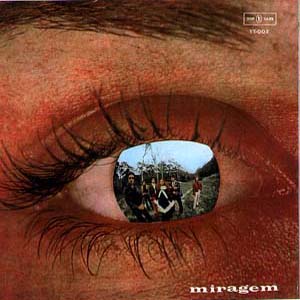 TRACKING LIST
TRACKING LIST
Side A:
1. SEU LÔBO
2. A HOMEM DE NEANDERTHALL
3. AVENIDA CENTRAL
4. MEU AMOR POR CRISTINA
5. YOU
Side B:
1. MIRAGEM
2. SANTA TERESA
3. DOROTÉIA
4. CARRO BRANCO
5. PASTA DENTAL SABOR CHICLETES
Bonus Tracks:
1. Cristina
2. Só Vejo Você
3. Cabine Classe A
4. Fanny
OS LOBOS - "MIRAGEM" - Mega rare gatefold jacket from this Brazilian Folk, Psychedelic, Beat, Garage, Folk, MPB, Brazilian Rock group. It's MEGA RARE. Pressing from 1971 on Top Tape label.
download link
pw: timospsychedelicious
 TRACKING LIST
TRACKING LISTSide A:
1. SEU LÔBO
2. A HOMEM DE NEANDERTHALL
3. AVENIDA CENTRAL
4. MEU AMOR POR CRISTINA
5. YOU
Side B:
1. MIRAGEM
2. SANTA TERESA
3. DOROTÉIA
4. CARRO BRANCO
5. PASTA DENTAL SABOR CHICLETES
Bonus Tracks:
1. Cristina
2. Só Vejo Você
3. Cabine Classe A
4. Fanny
OS LOBOS - "MIRAGEM" - Mega rare gatefold jacket from this Brazilian Folk, Psychedelic, Beat, Garage, Folk, MPB, Brazilian Rock group. It's MEGA RARE. Pressing from 1971 on Top Tape label.
download link
pw: timospsychedelicious
Samstag, Juni 17, 2006
Hi everyone!
I decided to make a couple of changes cos i was not satisfied with the look of my blog. Much better now imo :-) I added a chat room where you can post your requests for example. That's why the guestbook has disappeared cos twas actually not worth the effort. Hope you gonna like the new look as much as i do.
See you soon!
I decided to make a couple of changes cos i was not satisfied with the look of my blog. Much better now imo :-) I added a chat room where you can post your requests for example. That's why the guestbook has disappeared cos twas actually not worth the effort. Hope you gonna like the new look as much as i do.
See you soon!
Música Dispersa - 1971 - Música Dispersa (Outstanding Spanish Folk Psych rarity)

The album of Musica dispersa is really different to any other tjhing, and even if one listens it today it's difficult to realise whether one is listening to a masterpiece of art of to a silly thing with no other purpose. It's a mostly acoustic recording and utilices the voices like one instrument more, no lyrics are sung. I can not find any influence from other artists and no other artists have been influenced by them later. It's hard to get into this wold of crazyness, but when you're in, you will find moments of extraordinay beauty. Sisa was one of the members of this band, being later one of the most important singers of the Catalan scene.
download link
pw: timospsychedelicious

320 kbit/s, 78.1mb, 10 tracks
Música Dispersa joined in Barcelona in 1970, when they recorded their only album, published by Diabolo (reedited in 1979 by Edigsa), in which they developed a really avant-garde music, with hypnotic rhythms, eastern influences, and sensual voices (Selene) producing onomatopeyic sounds that transport you to another dimension. They had a very short life, round to one year. Their main composer was "El Cachas" from Madrid and among the members was a young Jaume Sisa, that was then an institution in the catalan music. I can state that their record was one of the best in that time (if not the best) and of course the most original and experimental one. orlando iglesiasThe album of Musica dispersa is really different to any other tjhing, and even if one listens it today it's difficult to realise whether one is listening to a masterpiece of art of to a silly thing with no other purpose. It's a mostly acoustic recording and utilices the voices like one instrument more, no lyrics are sung. I can not find any influence from other artists and no other artists have been influenced by them later. It's hard to get into this wold of crazyness, but when you're in, you will find moments of extraordinay beauty. Sisa was one of the members of this band, being later one of the most important singers of the Catalan scene.
download link
pw: timospsychedelicious
Freitag, Juni 16, 2006

The Aerovons' story sounds like a fairytale, and in most respects it was a fairytale come true, except for the anticlimactic grim ending. It was probably the dream of millions of teenage American boys to meet the Beatles and record at Abbey Road Studios in the late 1960s. The Aerovons, unlike virtually every other such band, did so. Personnel instability intervened, however, and the group only got to issue a couple of rare singles before splitting up. They did record an entire album of promising material heavily influenced by the late-'60s Beatles, which finally saw release on CD in 2003.
The Aerovons were formed in 1966 in St. Louis, and in late 1967guitarist/pianist Tom Hartman recorded a demo of his composition "A World of You" at the instigation of his mother. The demo was heard by a representative of Capitol Records, and though he offered the group a session in Los Angeles, Hartman's mother told him the band wanted to record in London. In early 1968, the still-young Aerovons -- Hartman was 16 -- flew to London to play their demo for EMI. EMI was impressed enough to sign them when Hartman and his mother returned to London in August 1968, and the Aerovons even got another offer at the time with Decca. The whole band came back to London in March 1969 to record.
Over the next few months the group cut about an album's worth of material at Abbey Road. Unsurprisingly considering the surroundings, and considering that the Beatles were the group's heroes anyway, the material sounded much like the Beatles did circa 1967-1969, though on the lighter side of what the Beatles themselves came up with. More surprisingly, the album was produced by Hartman himself, who also wrote most of the songs laid down in the studio. Though the sessions were quite well-produced and well-arranged, with some of the settings also reminiscent of the late-'60s Bee Gees or (more distantly) Hollies, the songs were still too derivative to have stood much chance of making a big mark had everything been issued at the time.
In a perfect world, perhaps such a young group should have been given some more time to hone a more original sound. It was and is an imperfect world, however, and before an album could even be released, fate intervened to end the Aerovons' brief career. The sessions had themselves been done as a three-piece, although they'd come over to London as a quartet, when guitarist Phil Edholm left before recording began. Shortly after returning to St. Louis in mid-1969, drummer Mike Lombardo left. EMI, concerned about the personnel shifts, canceled the album, and the band split up shortly afterward, though a couple of rare singles were issued on Parlophone in 1969. Hartman did a single for Bell in 1970 before abandoning the record business to go to college, though he later got into writing music for television, radio, and film. The Aerovons' canceled album was issued on CD by RPM in 2003, with both tracks from a non-LP single, a demo, and an unreleased song added as bonus cuts. ~ Richie Unterberger, All Music Guide
download link
pw: timospsychedelicious
Attention!
Ok, no new posts unless there are at least 2 comments per posted album...
Ok, no new posts unless there are at least 2 comments per posted album...
Mittwoch, Juni 14, 2006
Maitreya Kali - 1971 - Apache

Size: 47mb; Bitrate: 192kb/s; 12 tracks
Recorded by a freak who hung out with members of The Beach Boys and the Monkees (he actually wrote the song Salesman) Maitreya Kali (Craig Smith) recorded these tracks between '67-'71 in between travelling in Peru and the Far East. The result is an incredible set of songs that explore trippy '60s styled psych and bonged out hippy folk, all of which is laced with a weird, mystical vibe.
This was apparently released before "Inca" but the recordings have a later sound. Continuing his trek down Latin America, this is more lowkey and introvert, like if the drugs caught up with him. The strange poetry and scribblings on the sleeve confirm such suspicions. Has a couple of marvy acid folkpsych tracks but doesn't really live up to the hype I've seen on it. Has Mike Love singing on a Monkees track (actually he's just humming along from the mixing board) that Maitreya wrote when he was still known as Craig Smith. Both LPs have great Yahowa-style sleeves. [PL]
---
"Apache" and "Inca" are actually a self-released collection of Craig Smith's recordings with and without band from the mid to late 60s which neatly document his mental disintegration, likely due to drug use. Craig refers to himself as Maitreya Kali on these LPs although he does manage to thank himself as well, as Craig Smith, in the credits. "Apache" features softer acid folk tracks with pretty, gliding vocals (sometimes treated). Mike Love sings on "Salesman" and the LP is dedicated to Jimi Hendrix. The LP also has a couple heavy trippers of note, "Color Fantasy" and "Swim". The followup, "Inca", is heavier with a turned-on folkrock sound and underground Donovan teatime lyricism. Craig previously recorded singles with Penny Arkade, and Chris & Craig.
Source: lysergia.com
download link
pw: timospsychedelicious

Size: 47mb; Bitrate: 192kb/s; 12 tracks
Recorded by a freak who hung out with members of The Beach Boys and the Monkees (he actually wrote the song Salesman) Maitreya Kali (Craig Smith) recorded these tracks between '67-'71 in between travelling in Peru and the Far East. The result is an incredible set of songs that explore trippy '60s styled psych and bonged out hippy folk, all of which is laced with a weird, mystical vibe.
This was apparently released before "Inca" but the recordings have a later sound. Continuing his trek down Latin America, this is more lowkey and introvert, like if the drugs caught up with him. The strange poetry and scribblings on the sleeve confirm such suspicions. Has a couple of marvy acid folkpsych tracks but doesn't really live up to the hype I've seen on it. Has Mike Love singing on a Monkees track (actually he's just humming along from the mixing board) that Maitreya wrote when he was still known as Craig Smith. Both LPs have great Yahowa-style sleeves. [PL]
---
"Apache" and "Inca" are actually a self-released collection of Craig Smith's recordings with and without band from the mid to late 60s which neatly document his mental disintegration, likely due to drug use. Craig refers to himself as Maitreya Kali on these LPs although he does manage to thank himself as well, as Craig Smith, in the credits. "Apache" features softer acid folk tracks with pretty, gliding vocals (sometimes treated). Mike Love sings on "Salesman" and the LP is dedicated to Jimi Hendrix. The LP also has a couple heavy trippers of note, "Color Fantasy" and "Swim". The followup, "Inca", is heavier with a turned-on folkrock sound and underground Donovan teatime lyricism. Craig previously recorded singles with Penny Arkade, and Chris & Craig.
Source: lysergia.com
download link
pw: timospsychedelicious
Montag, Juni 12, 2006
Azteca - 1972 - Azteca
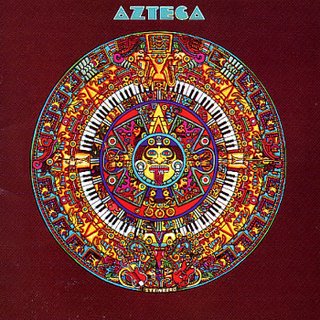
TRACKS (total time 46:58) :
1. La Piedra Del Sol (1:13) [T.Harrell, L.White]
2. Mamita Linda (3:42) [J.Vincent, T.Donlinger]
solos: Coke Escovedo, timbales; Bob Ferreira, piccolo
3. Ain't Got No Special Woman (5:59) [R.Reyes, M.Pearson, T.Harrell]
solos: Rico Reyes, vocal; Victor Pantoja, conga and vocal; Mel Martin, piccolo;
Neal Schon, guitar
4. Empty Prophet (5:20) [J.Vincent, R.Canoff]
solos: Errol Knowles, vocal; Mel Martin, tenor saxophone; Jim Vincent, guitar
5. Can't Take The Funk Out Of Me (4:23) [P.Jackson]
solos: Paul Jackson, vocal; George DiQuattro, clavinet
6. Peace Everybody (4:32) [G.DiQuattro, P.Escovedo]
solos: Bob Ferreira, tenor saxophone; Neal Schon, guitar
7. Non Pacem (6:40) [F.Núnez]
solos: Tom Harrell, trumpet; Mel Martin, soprano saxophone
8. AH! AH! (3:24) [T.Puente, P.Escovedo]
9. Love Not Then (5:01) [F.Núnez]
solos: Wendy Haas, vocal; George Moribus, piano; Flip Núnez, organ
10. AZTECA (4:38) [A.Bent]
solos: George DiQuattro, piano; Lenny White, drums; Victor Pantoja, conga
11. Theme: La Piedra Del Sol (1:54)
Line-up:
Coke Escovedo : timbales
Victor Pantoja : conga drums, vocals
Flip Núnez : organ
George Moribus : electric piano
George DiQuattro : acoustic piano, clavinet
Paul Jackson : acoustic bass, fender bass
Lenny White III : drums, vocals
Jules Rowell : valve trombone
Tom Harrell : trumpet
Mel Martin : soprano saxophone, tenor saxophone,
baritone saxophone, flute, piccolo
Bob Ferreira : tenor saxophone, piccolo
Neal Schon : guitar (on 3,5,6)
Jim Vincent : guitar (all tune)
Pete Escovedo : vocals
Errol Knowles : vocals
Wendy Haas : vocals
Rico Reyes : vocals
Azteca - Ain't got no special woman, taken from their debut album, released in 1972. Azteca at times numbered as many as eighteen musicians, with four very good vocalists. Percussionist Coke Escovedo, uncle of Sheila E ( her father being Pete Escovedo ), formed this powerful Latin rock outfit in 1972. Escovedo, of course, was well known for his work with Santana, and he also went on to release a number of solo albums. Azteca featured a very young Lenny White on drums, later to feature with Chick Corea, Stanley Clarke and Al Di Meola in Return to Forever.They released two albums, one of which, this debut, was released on CD a few years ago by GNP Records. Coke Escovedo sadly died on 13 July 1986, and his son, Paris, has revived Azteca, and they're playing old as well as new material. It would be quite an experience to hear what they sound like today!
download link
pw: timospsychedelicious

TRACKS (total time 46:58) :
1. La Piedra Del Sol (1:13) [T.Harrell, L.White]
2. Mamita Linda (3:42) [J.Vincent, T.Donlinger]
solos: Coke Escovedo, timbales; Bob Ferreira, piccolo
3. Ain't Got No Special Woman (5:59) [R.Reyes, M.Pearson, T.Harrell]
solos: Rico Reyes, vocal; Victor Pantoja, conga and vocal; Mel Martin, piccolo;
Neal Schon, guitar
4. Empty Prophet (5:20) [J.Vincent, R.Canoff]
solos: Errol Knowles, vocal; Mel Martin, tenor saxophone; Jim Vincent, guitar
5. Can't Take The Funk Out Of Me (4:23) [P.Jackson]
solos: Paul Jackson, vocal; George DiQuattro, clavinet
6. Peace Everybody (4:32) [G.DiQuattro, P.Escovedo]
solos: Bob Ferreira, tenor saxophone; Neal Schon, guitar
7. Non Pacem (6:40) [F.Núnez]
solos: Tom Harrell, trumpet; Mel Martin, soprano saxophone
8. AH! AH! (3:24) [T.Puente, P.Escovedo]
9. Love Not Then (5:01) [F.Núnez]
solos: Wendy Haas, vocal; George Moribus, piano; Flip Núnez, organ
10. AZTECA (4:38) [A.Bent]
solos: George DiQuattro, piano; Lenny White, drums; Victor Pantoja, conga
11. Theme: La Piedra Del Sol (1:54)
Line-up:
Coke Escovedo : timbales
Victor Pantoja : conga drums, vocals
Flip Núnez : organ
George Moribus : electric piano
George DiQuattro : acoustic piano, clavinet
Paul Jackson : acoustic bass, fender bass
Lenny White III : drums, vocals
Jules Rowell : valve trombone
Tom Harrell : trumpet
Mel Martin : soprano saxophone, tenor saxophone,
baritone saxophone, flute, piccolo
Bob Ferreira : tenor saxophone, piccolo
Neal Schon : guitar (on 3,5,6)
Jim Vincent : guitar (all tune)
Pete Escovedo : vocals
Errol Knowles : vocals
Wendy Haas : vocals
Rico Reyes : vocals
Azteca - Ain't got no special woman, taken from their debut album, released in 1972. Azteca at times numbered as many as eighteen musicians, with four very good vocalists. Percussionist Coke Escovedo, uncle of Sheila E ( her father being Pete Escovedo ), formed this powerful Latin rock outfit in 1972. Escovedo, of course, was well known for his work with Santana, and he also went on to release a number of solo albums. Azteca featured a very young Lenny White on drums, later to feature with Chick Corea, Stanley Clarke and Al Di Meola in Return to Forever.They released two albums, one of which, this debut, was released on CD a few years ago by GNP Records. Coke Escovedo sadly died on 13 July 1986, and his son, Paris, has revived Azteca, and they're playing old as well as new material. It would be quite an experience to hear what they sound like today!
download link
pw: timospsychedelicious
Sonntag, Juni 04, 2006
Hi everyone!
I'm going on vacation to Spain for a week. So in case you should see a Spanish flag, it could be me ;-).
See you soon! :)
Timo
I'm going on vacation to Spain for a week. So in case you should see a Spanish flag, it could be me ;-).
See you soon! :)
Timo
Samstag, Juni 03, 2006
Ugly Custard - 1971 - Ugly Custard

14 tracks
Line-up:
Clem Cattini - Drums
Roger Coulham - Keyboards
Herbie Flowers - Bass
Alan Parker - Guitar
This UK classic sees finally a proper reissue thanks to Wah Wah. This studio session group -also known as The Mohawks- formed by Clem Clattini (drums), Roger Coulham (keyboards), Herbie Flowers (bass) and library maestro Alan Parker on killer guitar released this obscure album on Kaleidoscope records in 1971...

Wah Wah Reissue
download link
pw: timospsychedelicious

14 tracks
Line-up:
Clem Cattini - Drums
Roger Coulham - Keyboards
Herbie Flowers - Bass
Alan Parker - Guitar
This UK classic sees finally a proper reissue thanks to Wah Wah. This studio session group -also known as The Mohawks- formed by Clem Clattini (drums), Roger Coulham (keyboards), Herbie Flowers (bass) and library maestro Alan Parker on killer guitar released this obscure album on Kaleidoscope records in 1971...

Wah Wah Reissue
download link
pw: timospsychedelicious
Freitag, Juni 02, 2006
Shiva's Headband - 1971 - Coming To A Head

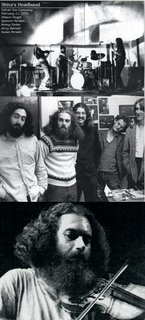
Link is here
another link is here
11 tracks + 1 live bonus track
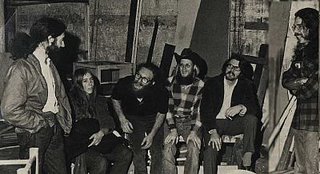
and finally:
the download link
pw: timospsychedelicious


Link is here
another link is here
11 tracks + 1 live bonus track

and finally:
the download link
pw: timospsychedelicious
Donnerstag, Juni 01, 2006
The Zig Zag People - 1969 - Take Bubble Gum Music Underground

9 tracks
The Phish of their day, The Zig Zag People were jam-happy session players psychedelisizing bubblegum songs made famous by 1910 Fruitgum Co., Music Explosion, Tommy James & The Shondells, and Ohio Express. Group named after either a maneuver performed by a football running back or a type of paper used to wrap a particular herb. The answer was not available at press time. The highlight is “Sally Goes To The Dentist” if only because the group pokes fun at Buddah Records located at 1650 Broadway.
Who actually played and sang on this great album? No one knows. By the sound of things, maybe a Blood, Sweat, or Tear. Possibly a Steppenwolf. Regardless, these spacy, jazzy covers (with Chewy as a highlight) and two excellent originals written by Jack Murphy & Mickey Earle (Sally & Peel) makes this a must album to search out, roll up, and smoke on your turntable.
download link
pw:timospsychedelicious

9 tracks
The Phish of their day, The Zig Zag People were jam-happy session players psychedelisizing bubblegum songs made famous by 1910 Fruitgum Co., Music Explosion, Tommy James & The Shondells, and Ohio Express. Group named after either a maneuver performed by a football running back or a type of paper used to wrap a particular herb. The answer was not available at press time. The highlight is “Sally Goes To The Dentist” if only because the group pokes fun at Buddah Records located at 1650 Broadway.
Who actually played and sang on this great album? No one knows. By the sound of things, maybe a Blood, Sweat, or Tear. Possibly a Steppenwolf. Regardless, these spacy, jazzy covers (with Chewy as a highlight) and two excellent originals written by Jack Murphy & Mickey Earle (Sally & Peel) makes this a must album to search out, roll up, and smoke on your turntable.
download link
pw:timospsychedelicious
The Trip - 1970 - The Trip (Italian Psychedelia)
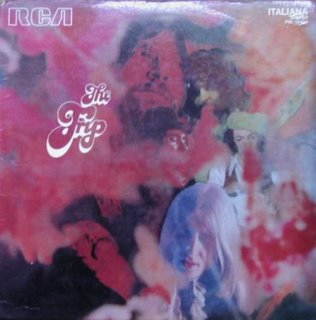
track listing:
1 Prologo
2 Incubi
3 Visioni Dell'aldilà
4 Riflessioni
5 Una Pietra Colorata
One of many english bands coming to Italy in search of success during the beat-era, The Trip included a young Ritchie Blackmore in their first line-up, along with founder members Andersen and Gray and drummer Ian Broad, but a line-up change brought two italians in, keyboards player Joe Vescovi from Savona (later the leading figure in the band) and drummer Pino Sinnone from Turin.
With a stable line-up the band had a good recording deal with RCA and released their first album in 1970, and a single taken from it.
The Trip (sometimes referred to as Musica Impressionistica, from a title on back cover) can't be yet considered a prog album, rather a rock-blues LP, with five long pieces led by guitar and organ. The long opening cut Prologo, is a good introduction to the band's sound that since their early days has always mixed english and italian-sung tracks in their production.
Also in 1970 the band members acted in the film Terzo canale - Avventura a Montecarlo, a nonsense comedy based on the story of a band trying to get to Montecarlo from Italy and playing the Rome Caracalla Pop Festival in the end.
With Caronte, in 1971, the Trip's sound became much more original, with more space to Joe Vescovi's keyboards. Since the first notes of Caronte I, the opening track, it's clear that a classical influence has enriched the band's sound. The long Two brothers is another highlight of a very important album.
After the second album two members quit the band, with Billy Gray releasing a solo album, and the band kept on as a trio with new drummer, the young Furio Chirico from Turin, coming from some important rock experiences with 60's groups I Ragazzi del Sole and Martò e i Judas.
Atlantide, housed in an ambitious gimmix cover, obviously sees the leading role of Joe Vescovi's keyboards, with the sound veering toward an ELP-like style. The band was now very popular in Italy, and the album's first copies contain a promotional single with a long interview and excerpts from the LP.
The same line-up released the fourth and last album, this time with the short-lived Trident label. Time of change contains yet another step in the band's sound evolution, still keyboard-based but with stronger classical and jazzy influences.
After Time of change drummer Chirico left to form Arti & Mestieri, the others tried to revive the band with the help of Osage Tribe's drummer Nunzio Favia, but the band split after some months.
Joe Vescovi briefly joined Acqua Fragile at the end of 1974 and later both he and Favia joined Dik Dik.
Link is here
download link
pw: timospsychedelicious

track listing:
1 Prologo
2 Incubi
3 Visioni Dell'aldilà
4 Riflessioni
5 Una Pietra Colorata
One of many english bands coming to Italy in search of success during the beat-era, The Trip included a young Ritchie Blackmore in their first line-up, along with founder members Andersen and Gray and drummer Ian Broad, but a line-up change brought two italians in, keyboards player Joe Vescovi from Savona (later the leading figure in the band) and drummer Pino Sinnone from Turin.
With a stable line-up the band had a good recording deal with RCA and released their first album in 1970, and a single taken from it.
The Trip (sometimes referred to as Musica Impressionistica, from a title on back cover) can't be yet considered a prog album, rather a rock-blues LP, with five long pieces led by guitar and organ. The long opening cut Prologo, is a good introduction to the band's sound that since their early days has always mixed english and italian-sung tracks in their production.
Also in 1970 the band members acted in the film Terzo canale - Avventura a Montecarlo, a nonsense comedy based on the story of a band trying to get to Montecarlo from Italy and playing the Rome Caracalla Pop Festival in the end.
With Caronte, in 1971, the Trip's sound became much more original, with more space to Joe Vescovi's keyboards. Since the first notes of Caronte I, the opening track, it's clear that a classical influence has enriched the band's sound. The long Two brothers is another highlight of a very important album.
After the second album two members quit the band, with Billy Gray releasing a solo album, and the band kept on as a trio with new drummer, the young Furio Chirico from Turin, coming from some important rock experiences with 60's groups I Ragazzi del Sole and Martò e i Judas.
Atlantide, housed in an ambitious gimmix cover, obviously sees the leading role of Joe Vescovi's keyboards, with the sound veering toward an ELP-like style. The band was now very popular in Italy, and the album's first copies contain a promotional single with a long interview and excerpts from the LP.
The same line-up released the fourth and last album, this time with the short-lived Trident label. Time of change contains yet another step in the band's sound evolution, still keyboard-based but with stronger classical and jazzy influences.
After Time of change drummer Chirico left to form Arti & Mestieri, the others tried to revive the band with the help of Osage Tribe's drummer Nunzio Favia, but the band split after some months.
Joe Vescovi briefly joined Acqua Fragile at the end of 1974 and later both he and Favia joined Dik Dik.
Link is here
download link
pw: timospsychedelicious